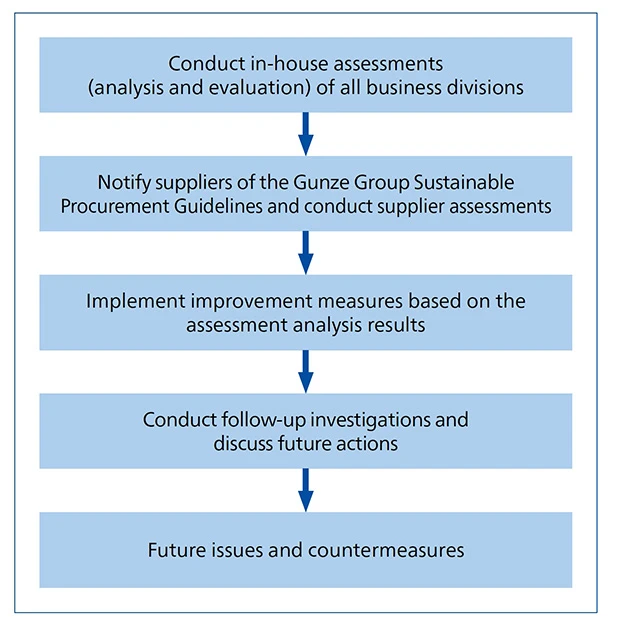| Business area | No. of relevant suppliers | Response rate |
|---|---|---|
| Apparel Business | 75 companies | 72% |
| Medical Materials Business | 5 companies | 100% |
| Plastic Films Business | 14 companies | 100% |
GUNZE'S HUMAN RIGHTS POLICY STATEMENT
We have inherited our founder’s mindset and shared it as our corporate philosophy for over the 120 years: People-oriented approach, commitment to quality, and harmonious coexistence.
The following " GUNZE’S HUMAN RIGHTS POLICY " is established in order to clearly express our commitment to ensuring the corporate philosophy to respect for human rights.
1. We endorse the UN Global Compact, the UN Guiding Principles on Business and Human Rights and other international principles relating to human rights.
2. In our business activities, we respect the human rights, individuality, and diversity, and do not discriminate against people because of their race, nationality, gender, or other factors.
We strictly prohibit any child labor, forced labor and inhuman treatment including cruel disciplinary punishments.
3. We implement the initiatives as stipulated in our in-house "Sustainability Promotion Rules" to respect the human rights of all employees, identify the negative impacts on human rights and endeavor to remediate them ,through appropriate processes such as whistleblower system.
4. We require our supplier to comply with " Gunze Group Supplier Code of Conduct" in accordance with the " Gunze Group Sustainable Procurement Guidelines", , gather information on any risks that could cause negative impacts on human rights, and work to prevent and mitigate the identified negative impacts.
5. We continue to provide necessary training for all employees to respect for human rights and deepen the understanding of employees on human rights issues.
With a corporate name that expresses our intent of protecting local communities as our basic policy, Gunze Founding philosophy takes a people-oriented approach.Over our 127 years of history, we have therefore valued the rights of employees and all other related parties. Inorder to clarify our stance on this respect for human rights while taking into account international norms, we formulated and announced the GUNZE’s HUMAN RIGHTS POLICY in June 2022.
Initiatives implemented up to April 2023 are as follows.
In the apparel business, one of our main businesses, we conducted a survey of six factories in Japan that accept foreign technical interns. With media reports and other sources suggesting that trainees are prone to human rights risks,we undertook this initiative as a priority issue to understand the actual situation of foreign technical interns.
Method
Interviews were conducted with regard to appropriate working hours, wages, living environment, and occupational health and safety at work sites, based on the items to be checked as exemplified in a separate volume of the“Guidelines for Responsible Corporate Conduct in the TextileIndustry”※1 issued by the Japan Textile Federation (JTF).
Assessment results and future actions
Although no major human rights risks were identified, we discovered issues that need to be improved, such as the necessity to establish a Vietnamese language consultation service. In the future, we will promote measures to address this issue and develop a system to conduct periodic assessments by including a survey of the actual conditions of foreign technical interns in internal audit items.
We ask that suppliers understand the Gunze GroupSustainable Procurement Guidelines, which include the perspective of the Gunze Group’s respect for human rights.In addition, from December 2022 to April 2023, we conducted assessments of all business divisions, with priority given to key suppliers of the following business divisions.
Method
We had suppliers conduct a self-assessment based on theGlobal Compact Network Japan’s Self-AssessmentQuestionnaire※2for CSR procurement in order to confirm the status of their initiatives for human rights considerations,environmental conservation as well as quality and safety.
Assessment results and future actions
No critical human rights issues were identified in the scope of this submission. We are considering future efforts such as offering training programs for suppliers to gain their understanding and cooperation in our human rights initiatives.We also plan to expand the scope of assessment to include overseas suppliers. We will continue our efforts to prevent and address issues through such measures as strengthening the operation of our whistleblower systems.
※1 Guidelines for Responsible Corporate Conduct in Textile Industry: Guidelines for promoting corporate activities that respect international human rights, formulated by theJapan Textile Federation in cooperation with the International Labour Organization(ILO) Office in Japan.
※2 Self-Assessment Questionnaire for CSR procurement: Questionnaire developed by theGlobal Compact Network Japan to assess degree of understanding of CSR requirements.
Human Rights Due Diligence※3Implementation Flow

※3 A process for identifying negative impacts on and risks for human rights, analyzing and evaluating risks, and formulating and implementing appropriate measures